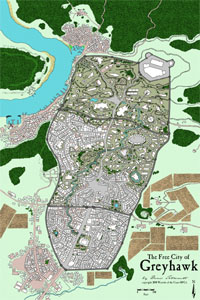 Yesterday I posted a conceptual system for generating the local market for magic items. Today, using the automatic treasure generator at Alderon’s Tower, I’m going to rapidly generate the local market for magic items in the City of Greyhawk.
Yesterday I posted a conceptual system for generating the local market for magic items. Today, using the automatic treasure generator at Alderon’s Tower, I’m going to rapidly generate the local market for magic items in the City of Greyhawk.
THE MARKET LIST
(1) The City of Greyhawk has a population of 160,000. So using Treasure Type A I generate 160 treasure parcels and write down the resulting list of magic items. This took me about 15 minutes and resulted in a list of 137 items.
(2) While generating the list, I’m also jotting down ideas which occur to me during the process. For example, I notice that I’m generating an unusual number of cursed scimitars accompanied by a single magical scimitar. I’m struck with the idea of a con artist using the scimitar +2 to demonstrate how amazing his magical scimitar is, and then swapping it out for one of the cursed scimitars when the sale is actually completed. I also notice several water-themed items, including an Apparatus of Kwalish. Has someone discovered a sunken wreck in the Nyr Dyv?
MODIFYING THE MARKET
Greyhawk is a haven for adventuring-types and a hive of magic-users, so I’m going to posit that the market for magic items is fairly active and update it every session.
(1) I roll 16 new treasure parcels and add them to the market list:
oil of etherealness
wand of metal and mineral detection
libram of gainful conjuration
spear +2
bag of holding (500 lbs.)
(2) I roll 2d10 for (9 – 8 =) 1 + the 5 items I generated for a total of 6 items. I randomly eliminate 6 items from the market list:
potion of rainbow hues
cloak of protection +3
oil of air elemental invulnerability
pole arm +1
cloak of the bat
potion of blue dragon control
(3) Once again I try to keep the creative side of my brain churning: If a libram of gainful conjuration has been put up for sale, could it be from the collection of a local wizard? Is he dead and his estate being auctioned in pieces? Has she fallen on hard times and is trying to generate some fast coin?
And is there a reason somebody suddenly has a pressing need to control a blue dragon? Or is there perhaps a draconic cult trying to remove anti-dragon items from circulation? (If the PCs have such an item, might they be targeted?)













I assume this is for regular campaign play. It seems like a lot of prep for the open table concept.
This seems like a lot of preparation for the GM that the PCs really should be doing themselves. Getting inspiration from fluctuation magical markets from one thing – however much I loathe the concept of the “magic mart” – but surely the PCs should be doing something to gather this information.
Failing that, wouldn’t it be more intuitive to reverse the process, so create flavourful NPCs the PCs could actually deal with, and make the “markets” seem more personal – for example, they may encounter the Scimitar con-man hawking his cursed blades, or you might decide that a group of rival adventurers have discovered a new tomb of items, and are selling off items to the highest bidder, and take items from there for sale.
Think of the Spanish and their search for Eldorado – they would often sell off a few trinkets they claim to come from the fabled cities of gold to finance a full expedition to such places, and for the loose of tongue and foolish of mind, this could lead to them revealing the location where said trinkets were discovered and plot hooks aplenty.
It is almost certainly better to do it in the controlled manner of plot-first then apply the results, especially as you only need to do as much work as you need to determine what items are for sale as you need – in this way, you can define sources for items and let the PCs deal with them, rather than just a nameless list of items in a standard “magic mart” type scenario.
> It seems like a lot of prep…
Well, if you use a tool it’s probably not that much work. And it might actually be more useful to track available items in an open table environment, because then it could arise that characters would end up buying items that were sold by other characters from other expeditions. You would at least have the beginnings of a real market, as opposed to a characterization of one.
Why do this? Well, for one thing, it helps you avoid bias/abdicate responsibility. I don’t mean to be pejorative — if you don’t randomly pre-determine what items are available, you end up making decisions by fiat. Which gives you more control, but it also creates expectations in the players that you might not want to create. And it could lead to resentment — if the players can’t find that particular +2 gizmo they really want, well, it’s because YOU decided they shouldn’t be able to buy it. (Note: “randomly pre-determine” could also mean reducing player requests for a particular item to a die roll at the time, but if you _do_ pre-determine items it lets you cope with events like the PCs asking “well, what DOES this magic shop have in stock” without having to scramble.)
> Failing that, wouldn’t it be more intuitive to reverse the process…
That’s where I think he’s going with this. I wouldn’t just hand the PCs a list of “here, here’s everything magical that’s for sale in this city.” Depending on how much you and your group want to get into it, you could have them ask for what shops/sellers there are, maybe do some checks to find them, roleplay the bargaining session if you want to, and so on. And as in his example, just inspecting the generated list can lead to scenario/encounter/NPC ideas.
Incidentally, there’s a simple economic simulator/purchasing system in Magical Medieval Society: Western Europe that reduces buying stuff at some target price to a single d20 check, with modifiers for base price, community size, desired price point, and so on. I tinkered with it a bit to support the (attempted) selling of items for other than the base 50% price. It’s not a replacement for dickering or interacting with specific PCs; but if you want to just quickly handle requests like “I want to buy a +2 longsword, but I’m only willing to pay 7,500 gp. Can I find one?” it can do the job.
I think Leland has the right of it: This technique is probably most rewarding for an open table. The initial prep work can be daunting, but the actual maintenance of the market is fairly tame. And the fact that multiple groups will be adding and taking items off the market makes actual monitoring of the market far more interesting.
It should also be noted that I chose the City of Greyhawk because it’s very large (thus demonstrating that the technique is manageable even in extreme situations). By contrast, there are three major population centers in my new hexcrawl: One with roughly 20,000 people and a couple with less than 1,000 people. The initial prep work for the entire hexcrawl is 22 treasure checks, and then 4 checks or less for the inter-session prep. (A quick check indicates about 90 seconds to do the full update.)
> Surely the PCs should be doing something to gather this information.
Just so. The market list is generated for the DM’s reference. As I mentioned in part 1, the actual “market” could take any number of forms: Guys hocking on street corners. Mage guilds. Churches looking for tithes. Estate sales. The local store. Whatever works.
You could prep each of these separately ahead of time, but that’s a lot of work. 9 times out of 10, the interaction at the table will actually look like this:
Player: We need an apparatus of Kwalish. Anybody selling one?
Me: Give me a Gather Information check.
Player: 18.
Me: (checks the market list, sees that one is available) Okay, you’re in luck. The Fair Serpentine put into port last week having found a strange, metallic apparatus floating in the middle of the ocean. Captain Baldric has been looking for someone to buy the thing at a reasonable price. Your sources say he’s currently renting rooms from Molly Sang at the Sagging Nipple.
And away we go. What condition is it in? Why was it abandoned in the middle of the ocean? Will the PCs be able to talk Baldric into parting with it for a fraction of the price just to get the damn thing out of his hold? Is somebody else interested in it? Will the original owners come looking for it? I dunno. Guess we’ll find out.
OTOH, the list can also come in useful if the PCs decide to stop by Myraeth’s Oddities (where they know wanderers like themselves sell goods they’ve hauled out of the dungeons beneath Ptolus) and while chatting up Myraeth want to know what’s been brought into the shop of late. Let’s (arbitrarily) says Myraeth has 1d20 items on hand, which I can quickly determine by grabbing a chunk of my market list or rolling on it.
What I like about the market list is that it gives me a versatile tool that I can use in a lot of different ways to deal with situations when the players want to interact with the local market for magic items (regardless of what approach they’re taking in their interactions).
> Magical Medieval Society: Western Europe
I bought that PDF awhile back at an ENWorld sale, so I checked it out. Looks like the system needs a bit of a tweak so that the check generates the price you can find it at, but it looks like a pretty solid framework.
(They spend several paragraphs talking about how to deal with players trying multiple checks to get lower prices, but if you just make one check and it sets the current availability/price you should be in good shape.)
>> Magical Medieval Society: Western Europe
>
> Looks like the system needs a bit of a tweak so that the check generates the price you can find it at, but it looks like a pretty solid framework.
Yeah; I’ve done that, too, but haven’t really wheeled it out yet. By eye it looks reasonable, and you can fiddle with the modifiers to achieve different market conditions. I can see about posting it somewhere with a link tonight if you’re interested.
I’d be very interested in seeing that.
Hmm, I submitted a comment with a link in the Website field but it hasn’t showed up. Maybe it got stopped by your spam filter; here’s the link:
http://home.comcast.net/~leland53/Purchasing%20Checks.pdf
This hasn’t seen table use yet, but static analysis doesn’t look too unreasonable. It’s a work in progress; comments welcome. A lot of the modifiers are SWAGs subject to GM preference, of course.